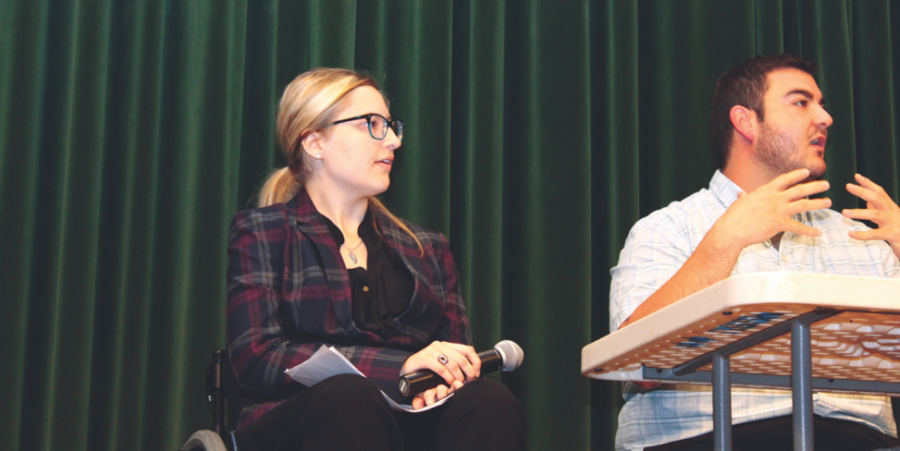Political Science department hosts series of debates
Shelby Wright, sophomore political science major, (left) was one of 10 students who participated in a series of debates Monday, October 24, 2016 in Corely Auditorium. The debates were moderated by political science professors Dr. Nicholas Nicoletti, (right) and Dr. William K. Delehanty
With the final debate of the 2016 presidential election season behind us, the last event of its kind after two other general election debates, nine Democratic primary debates, and 12 Republican primary debates, the Missouri Southern political science department decided to get in on the fun. More than a year after Donald Trump began the election season in earnest by calling Rosie O’Donnell a fat pig on Fox News, Southern students faced off in a series of five far-reaching topics ranging from ISIS and the appropriate US response, to paid family leave policy during a series of debates Monday night in Corley Auditorium.
The debates, co-sponsored by the Political Science Association (PSA), were moderated by University political science instructors Dr. William K. Delehanty, associate professor, and Dr. Nicholas Nicoletti, assistant professor. During the stimulating session, students also argued relevant topics dealing with immigration, international trade policy, and campaign finance reform.
The debate featured students discussing two sides to each issue with one taking the liberal position and the other taking the conservative stance. Debaters also fielded questions from audience members who were encouraged to ask questions in a town hall-style format. Furthermore, the moderators monitored social media platforms in real time where students were sending in questions directed to the orators.
David Harrington, senior criminal justice major, who spent four years in the Army and fought in Iraq, argued the “liberal” position in the debate on one of the most hotly contested issues of the evening, ISIS. Harrington signed up for the deliberations after Dr. Delehanty mentioned it during his Political Parties and Elections course. Harrington’s position was that NGO’s, non-governmental organizations, need to take a bigger role in defeating the terrorist group as opposed to putting American boots on the group.
“I fought some of these ass holes [ISIS] in 2008 and I got to sit in and speak with a couple of them who were being prepped for interrogation and it was very eye-opening,” he said. “ISIS was being formed back then; they just weren’t calling it ISIS.”
Harrington’s opponent, Steven Stokes, sophomore math, and economics major, was seemingly for America going back into Iraq on a larger scale, getting involved on the ground with the help of the Iraqi security forces and the Kurds.
“They need to be destroyed,” said Stokes. “We need to wipe them off the face of the planet by any means necessary.”
Stokes, who considers himself to be a libertarian/conservative ideologue, believes in small government, individual liberty, and a strong national defense. All of his policy positions derive from these beliefs.
“With regard to national security, I think if you look at history, it seems that the world is safest when America is strongest,” he said. “When we tried isolationism in the early 20 century, we faced two world wars. However, nation building in Iraq didn’t work either.”
Emmaleigh Pierson, junior undecided major, took the conservative position in her debate on international trade with Shelby Wright, sophomore political science major who had the liberal viewpoint. However, Wright varied from President Obama on certain key points, disagreeing with his stance on the Trans-Pacific Partnership, or TPP.
“We have to protect our country from making bad deals with countries that don’t respect us,” she said. “TPP does not meet the high standard we need. American’s cannot be used in a ploy to undercut our workers.”
Pierson who took the conservative stance, but in doing so, agreed with President Obama on TPP, a deal that also has widespread support from Republicans.
“Having trade agreements with these countries can be beneficial when you look at the fact that we also have military alliances with a lot of them,” she said. “In that sense, it would benefit both countries.”
Wright also ventured into topics of immigration when it comes to undocumented workers.
“We need workers to come out of the shadows and feel like they are productive members of our society,” she said.
Your donation will support the student journalists of Missouri Southern State University. Your contribution will allow us to purchase equipment and cover our annual website hosting costs.















